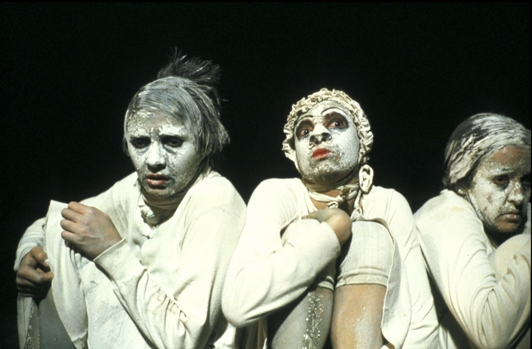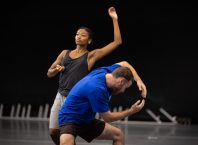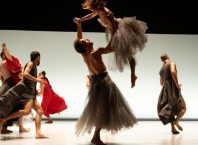
Hair matted, face and hands caked with clay, clad in night clothes that once may have been white, feet raising dust with every movement: it is an unusual ensemble that confronts the viewer of French choreographer Maguy Marin’s May B. The strange assembly, their movements at once odd and precise, feel almost archetypal, and that too, is not random. Marin first created May B in 1981, a dance piece inspired by the works of Samuel Beckett, and just as the words of the avant-garde writer evoke the essence of contemporary consciousness, this dance has struck such a profound chord with audiences that it has been performed ever since.
This spring, the Suzanne Dellal Centre is celebrating their 25th anniversary, and Maguy Marin is the first of an impressive guest list of international dance companies to grace us with their performance of the choreographer’s landmark work May B.
Marin began her career as a dancer, studying at Maurice Béjart’s Mudra school in Brussels in 1970, upon graduation she joined his dance company Ballet Du XX Siècle, and became a soloist in the company. Although her dance training was classical, her vision as a choreographer has taken her to other realms, and has been much applauded. Marin received a prize at the Bagnolet International Choreography Competition in 1978, and in the same year founded her dance company Theater de l’Arche, now the Maguy Marin Company. Internationally recognized for her work, Marin is a recipient of the 2003 American Dance Festival Award (rarely granted to non-Americans), and a Bessie Award in 2008.
Looking forward to the company’s performance of May B at Suzanne Dellal, I had the privilege of corresponding with Maguy Marin on her work.
Ayelet Dekel: May B is described as an homage to Samuel Beckett. Would you share with us your feeling of connection to Beckett’s work? What do you find in Beckett that inspires you, and how is this expressed in May B.?
Maguy Marin: My formation is a dance formation. While I was working with M.Béjart in the seventies, I started reading Beckett pieces. Bodies in ballet are so perfect, young and beautiful. I felt that dance concerns all bodies, that dance is much more than ballet, either classical or contemporary. I find in Beckett works something where I could find the way to express these ideas.
AD: Are there traces of specific works by Beckett in May B.?
MM: Yes, some of the characters appear in the piece: Waiting for Godot, Endgame, Come and Go, All that Fall (a radio play).
AD: What was your process in transforming a work of theatre into dance? How do you view the relationship between dance and theatre?
MM: I didn’t transform a work of theatre into dance. I read most of Beckett writings and that inspired me to do a choreographic piece. I just live it, come as it come.
AD: You have mentioned that you spoke with Beckett about May B. and he supported and encouraged this work. Did he ever see a performance?
MM: No, he didn’t come to see the performance.
AD: In Beckett’s play Krapp’s Last Tape, we see two editions of a man: his present self, and his past – recorded on tape. One might describe May B which premiered in 1981, as a different edition of Maguy Marin the choreographer. Do you view this work differently now? Have you made changes in the work since its original version?
MM: No, I didn’t change anything since 1981. This work is still very present because we are dancing it very often, so I don’t feel it different today from thirty years ago.
AD: Would you describe your creative process? Where do your ideas begin and how do you develop them?
MM: Everything comes from the effect Beckett’s writing make on my sensibility. That was the main purpose and strength.
AD: In the 1996 documentary by Jean-Michel Plouchard, you say that you do not like the term “dancers” and prefer “performers” or “interprete.” Would you talk about your relationship and process with the performers and interpreters of your work?
MM: Well, today I can say dancers, or interpretes or performers but I prefer to say that I work with persons. Their spirit is as important as their technique. I appreciate their open mind and strength in working.
AD: In your biography on the Compagnie Maguy Marin website, you describe your birth in Toulouse as the result of a series of “displacements” due to the political situation in Spain. Would you comment on how this has influenced your life and work?
MM: I just can say that one’s life is always an influence for art even though it is not so interesting to know about that.
AD: What are your thoughts on coming to Israel? Expectations, anxieties, hopes?
MM: I think that traveling in different countries is one of the most important things of our job. It gives the opportunity to meet people with other points of view, and that helps to keep an open mind.
Maguy Marin Company will perform May B. on May 2 & 3, 2014. Times and tickets are available on the Suzanne Dellal site.





